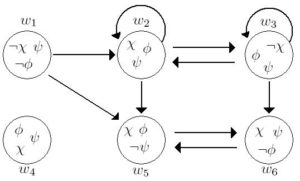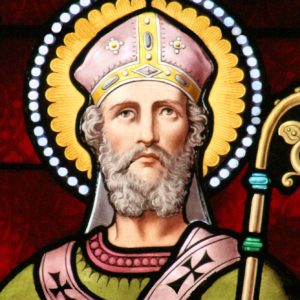 I have read many of your and many other Christians respond to many of the alleged contradictions of omniscience with either God’s attributes or things you believe exist in humans (Libertarian Free Will) and I have seen answers that seem adequate. However, I see a possible problem within omniscience that may mean that the concept simply destroys itself. I don’t remember in what context this idea arose within me, however, what I associate it is with Laplace’s Demon. You may or may not be aware of what the thought experiment is, but it is an illustration of Determinism-that if a very intelligent demon was outside the universe and knew everything about how it is at the moment, including the laws of physics then it would be able to calculate exactly what would happen in a trillion years. (Assuming naturalism and that nothing would affect the universe).
I have read many of your and many other Christians respond to many of the alleged contradictions of omniscience with either God’s attributes or things you believe exist in humans (Libertarian Free Will) and I have seen answers that seem adequate. However, I see a possible problem within omniscience that may mean that the concept simply destroys itself. I don’t remember in what context this idea arose within me, however, what I associate it is with Laplace’s Demon. You may or may not be aware of what the thought experiment is, but it is an illustration of Determinism-that if a very intelligent demon was outside the universe and knew everything about how it is at the moment, including the laws of physics then it would be able to calculate exactly what would happen in a trillion years. (Assuming naturalism and that nothing would affect the universe).
Now a question that naturally arises is if the hypothetical Demon could similarly know literally everything about itself. The conclusion I came to was that it would be logically impossible for that to happen. This is because of this: in order to be aware of everything it would have to be aware of the fact that it knows everything, and then it would have to be aware of the fact that it knows that it knows everything and then aware of the fact that it knows that it knows that it knows everything and so on and so forth. This would be an infinite regress.
But perhaps someone may protest that this infinite series can be extended on forever in God (or the demon) and there is no problem. But, that doesn’t solve it-is God aware of the fact that there is an infinite series of facts that he knows about himself? And is God aware of the fact that he knows the fact that there is an infinite series of facts that he knows? And does he know that fact and so on and so forth. And is he aware that there is a second infinite regress? And is he aware of that fact that he is aware of the fact that there is an infinite regress? This will create yet another infinite regress.
Finally, does God know that he knows about a third infinite regress? I believe you understand what would entail-does he know that he knows that fact, does he know that he knows that, etc. And the same goes with a 4th infinite regress and a 5th one and a thousandth one and a ten-thousandth one and a trillionth one on to another irresolvable infinite regress. Let’s put the argument that follows from this into a syllogism.
Premise 1. In order for God to know everything, he must know every proposition that is true or false in existence.
Premise 2. If God knows everything that includes the fact that he knows everything and the fact that he knows everything and that fact and so on and so forth resulting in an infinite regress. He then will enter a similar problem with him knowing the fact that he knows that there is an infinite regress and then a second one and then a third one on to infinity. This process cannot ever stop.
Premise 3. The process has to stop for God to at any point know every true or false proposition otherwise God would not know every proposition in existence.
Conclusion: God cannot know everything. (Premises 1-3).
Unless you dispute premise 1, I cannot see how this contradiction can be resolved. As Premise 2 has been defended more extensively above in a way that seems irrefutable and premise 3 simply obvious. And the out that may be given for Omnipotence that God performing a contradictory action is him performing nothing, cannot apply here since propositions about his knowledge aren’t nothing and another being who observes him could know one of those propositions. So unless the Biblical idea of omniscience is radically different from what modern day Christians believe the Christian God does not exist he is equivalent to a square circle if the argument holds up. (And this argument also applies to Islams Allah.) So this can meet the burden of proof required to be a Strong Atheist about the Christian/Muslim/Jewish God-that is to go beyond “I lack belief in this God” (Weak Atheism) to saying “this God doesn’t exist for sure.” (Strong Atheism). Although this objection doesn’t apply to a Deistic God, so full on Strong Atheism isn’t vindicated. I believe the concept of a Maximally Great Being is destroyed, however.
— Sam
——————————————————–
 If there’s one thing I can say about my discussions with you, it’s that they never fail to be mind stretching. Your objections to Christianity are anything but elementary. For readers new to this site, if Sam’s objection succeeded, it would successfully undermine the first premise of The Modal Ontological Argument that a Maximally Great Being exists. The first premise being that “It is possible that a Maximally Great Being Exists”. Usually, non-Christians bring up “The Omnipotence Paradox” which I address in this blog post and in chapter 5 of my upcoming book The Case For The One True God which defends The Ontological Argument. This is the first time I’ve read anyone charge the attribute of omniscience as being incoherent!
If there’s one thing I can say about my discussions with you, it’s that they never fail to be mind stretching. Your objections to Christianity are anything but elementary. For readers new to this site, if Sam’s objection succeeded, it would successfully undermine the first premise of The Modal Ontological Argument that a Maximally Great Being exists. The first premise being that “It is possible that a Maximally Great Being Exists”. Usually, non-Christians bring up “The Omnipotence Paradox” which I address in this blog post and in chapter 5 of my upcoming book The Case For The One True God which defends The Ontological Argument. This is the first time I’ve read anyone charge the attribute of omniscience as being incoherent!
Since this objection To The Ontological Argument was entirely new to me, I decided to send your argument to Randy Everist, who is formally trained in the philosophy of religion, to hear how he would deal with it. I had some thoughts of my own of course, and after reading Randy’s thoughts, I found out we had similar responses, but he articulated them much better than I would have. I’m glad I decided to consult him. Here’s what Everist wrote:
————————————————————–
 I’m happy to comment on this! There’s actually a lot that can be challenged here, and I’d first like to make a brief note on the implications of this argument. All that follows from this is that, at worst, traditional theism isn’t true. As Yujin Nagasawa has argued, using an ontological argument as well, all one has to do is amend one’s concept of the maximally great being (such that it is the maximally consistent set of great-making properties; if omniscience is excluded, this is interesting, but doesn’t defeat the maximally great being). While this is a cost for sure, it’s just worth noting this argument does not leave you with deism.
I’m happy to comment on this! There’s actually a lot that can be challenged here, and I’d first like to make a brief note on the implications of this argument. All that follows from this is that, at worst, traditional theism isn’t true. As Yujin Nagasawa has argued, using an ontological argument as well, all one has to do is amend one’s concept of the maximally great being (such that it is the maximally consistent set of great-making properties; if omniscience is excluded, this is interesting, but doesn’t defeat the maximally great being). While this is a cost for sure, it’s just worth noting this argument does not leave you with deism.
But let’s move to the premises themselves. They aren’t precise in a way that may be a problem later. I think we can slightly re-formulate the premises such that they form a reductio ad absurdum against God’s knowing everything (hopefully in a way your interlocutor finds agreeable):
1: God knows everything (or, God is omniscient; supposition for reductio)
2: If God knows everything, then a precondition is that he knows every true or false proposition in existence.
3: If God knows everything, then a precondition is that he knows every true or false proposition in existence, and this includes that he knows that he knows everything, and that he knows that he knows that he knows everything, and so on and so forth, infinitely (an infinite regress ensues).
4: If the consequent clause in (3) is true, then it can not be the case that God knows everything (for at any point he faces an infinite regress).
5: Therefore, it can not be the case that God knows everything.
6: So, it is both the case and not the case that God knows everything.
(3) should probably be cleaned up for validity and clarity’s sake, but I think we can see what he’s doing. The point of reductios is to show that accepting a particular belief yields a contradiction when combined with equally or more plausible premises. So we can see a contradiction ensues. The main question becomes whether or not these premises are plausible. Your interlocutor suggests what I have labelled (2) might be a place of pushback, while he (she?) labels (3) and (4) as “irrefutable” and “obvious.” (5) and (6) are conclusions and thus cannot be directly challenged. (1) is stipulated for the sake of the argument.
Indeed, I will suggest (2) is at the very least confusing. The original wording is this: “In order for God to know everything he must know every proposition that is true or false in existence.” I think this is too ill-defined, but it may not make any difference. Still, it’s worth noting that this claim, in order to be correct, has a couple of distinctions that must be made: first, it must be definitional. That is, what do we mean by God knowing “everything”? We must mean something like (or at least something that necessarily includes) “For any true proposition p, God knows p and does not believe not-p.” So then it turns out the last part just defines (at least part) what it means for God to know “everything.” Second, it will be false for certain tensed-propositions. Since propositions are abstract objects (truth-bearers), they don’t typically come into or out of existence (apologies to some very few possible exceptions). But this means their truth-values can change over time, or depending on who they’re talking about. Suppose we have the proposition “The President of the United States of America is in the Oval Office.” Is this true or false? Well, it depends. Is the president there now? But it also matters which president. This title isn’t a rigid designator and could be referring to George Washington, Barack Obama, Donald Trump, etc. Depending on who it refers to, it could be true or false, in addition to the time. So it’s important that God knows what propositions are true, and does not believe any false ones. So we’ll go ahead and amend that one to fit something like what is listed above in this paragraph.
So what about the next premise, which your interlocutor calls seemingly “irrefutable”? I actually found myself thinking that was the weakest link. He rightly points out that it is an infinite series: I know that p, I know that I know that p, so I know that I know that I know that p, etc. Before I get into implications of the infinite series, I do want to note one very serious point: some philosophers do not accept that there are any further facts (or “metafacts” as we might call them here) when it comes to knowing propositions, beyond knowing that p and maybe knowing that you know that p. In other words, it’s controversial to think one must know that he knows that p in order to know that p. While it seems like we have something with knowing that you know that p, it doesn’t seem to be a further fact that you know or don’t know that you know that you know that p.
How this applies to the current case as follows: In order for God to know the set of all truths, the set must contain the truth, ‘God knows the set of all truths,’ and God must know it. But then a new true proposition is in place, namely: ‘God knows that he knows the set of all truths.’ But if nothing further is required (e.g., it does seem at least suspect that some new fact is being described by anything further), then there is no infinite series. Thus, there is no further problem. In order to have an argument for this premise approaching anything near irrefutable, we must have a seemingly irrefutable argument for (and by extension, against this brief discussion I’ve laid out) the idea that in order to have p, you must have the metafacts about knowing and p thereafter.
OK, but now suppose we just accept the infinite series. Your interlocutor has kept saying it’s an infinite regress. But why think this? Not all infinite series are regresses. Why is this supposed to be a regress? Suppose we take the metafacts line above and add that in order to know that p, God must know that he knows that p. Why think this is true? In terms of the general principle, it’s nearly obviously false; we take as paradigmatic cases of knowledge situations in which people never bother to reflect on whether or not they know that they know that p. But suppose we formulate a sub-argument: A. If God knows the set of all truths, then among that set is that God knows that he knows all truths; B. If God among that set is that God knows that he knows all truths, then also among that set is that God knows that he knows that he knows all truths, to infinity. C. If this is to infinity, then it is an infinite regress. D. If it is an infinite regress, then God does not know the set of all truths.
All right; now we have a simple, straightforward argument that seems to capture your interlocutor’s reasoning behind what I have labeled (3) and (4). Remember, in this section, I’m dealing with the idea that this is supposed to be an infinite regress, and not merely an infinite series. In this case, I’m differentiating between a vicious sense of infinity and a benign sense of infinity. So, in this case, what do we have?
When we say God knows the set of all truths, what we must mean is that for any time t and set S, God knows S, where S at t is “P, P1, P2 . . . Pn .” But S either includes the metapropositions describing the metafacts above, or it doesn’t. If it doesn’t, by definition they (the metapropositions) aren’t true. If S does include them, and if we accept metapropositions as outlined above, then it’s true S will include an infinite number of them. So what’s the problem? C in my revamped sub-argument above is supposed to do the trick, but it only functions as an assertion. Best as I can tell from the original argument, it’s supposed to be an infinite regress (in a vicious way) because a necessary condition of God knowing the set of all truths is he must know that he knows the set of all truths, and as a necessary condition of God knowing that he knows the set of all truths, God must know that he knows that he knows the set of all truths, and as a necessary condition of God knowing that knows that he knows the set of all truths, God must know that he knows that he knows that he knows the set of all truths, and so on. But these don’t seem to be necessary conditions of one another; in fact, they seem to be entailments. Why think that? Simply because knowing that you know that p entails that you know p. In other words, you cannot first know that you know that p without already knowing that p. In the same way, God doesn’t need to know that he knows that p in order to know that p; he just would know this as part of the set of all truths, and it just so happens that the set of all truths is infinite! In other words, only if we already think there’s something wrong with God having an infinite set of propositions in his knowledge should we think there’s something wrong.
Finally, to be more precise, we should note that when we say God knows the set of all truths, this is itself a truth included in the set. It’s infinite, but it doesn’t seem to be anything more than an entailment, and this is only if we accept controversial presuppositions that haven’t been argued for. So, at the end of the day, there are a few ways to push back on this argument, and nothing presented here looks irrefutable.
——————————————–
Conclusion






I got a better version of this objection: does God know about each possible world where he decides to have yet another thought along the lines of “I know that I know, that I know…” In other words, wouldn’t possible worlds revive the infinite series? (And therefore the contradiction in the post, proving that the Christian God doesn’t exist?)
No. God’s knowledge of possible worlds is just God’s natural knowledge. I don’t think it works any more when you apply it to God’s natural knowledge then when you apply it to all three logical moments of God’s knowledge. I think Randy Everest response would still apply. And Randy Everest is a card-carrying Molinist, so I know he undoubtedly was thinking in these categories when forming his response.
.
His blog is actually called Possible Worlds.